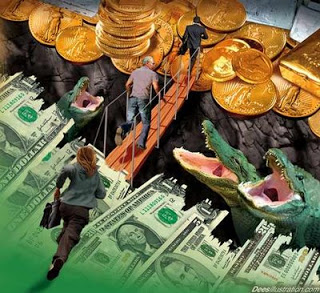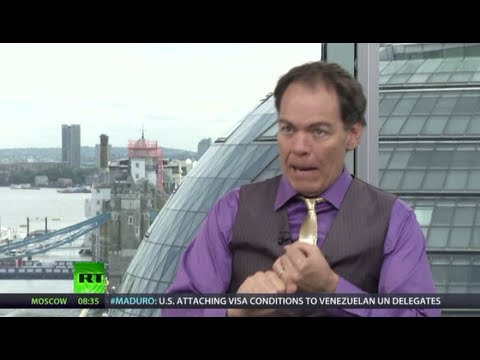Reports are that the Department of Homeland Security (DHS) is engaged in a massive, covert military buildup. An article in the Associated Press in February confirmed an open purchase order by DHS for 1.6 billion rounds of ammunition. According to an op-ed in Forbes, that’s enough to sustain an Iraq-sized war for over twenty years. DHS has also acquired heavily armored tanks, which have been seen roaming the streets. Evidently somebody in government is expecting some serious civil unrest. The question is, why?
Recently revealed statements by former UK Prime Minister Gordon Brown at the height of the banking crisis in October 2008 could give some insights into that question. An article on BBC News on September 21, 2013, drew from an explosive autobiography called Power Trip by Brown’s spin doctor Damian McBride, who said the prime minister was worried that law and order could collapse during the financial crisis. McBride quoted Brown as saying:
If the banks are shutting their doors, and the cash points aren’t working, and people go to Tesco [a grocery chain] and their cards aren’t being accepted, the whole thing will just explode.
If you can’t buy food or petrol or medicine for your kids, people will just start breaking the windows and helping themselves.
And as soon as people see that on TV, that’s the end, because everyone will think that’s OK now, that’s just what we all have to do. It’ll be anarchy. That’s what could happen tomorrow.
How to deal with that threat? Brown said, “We’d have to think: do we have curfews, do we put the Army on the streets, how do we get order back?”
McBride wrote in his book Power Trip, “It was extraordinary to see Gordon so totally gripped by the danger of what he was about to do, but equally convinced that decisive action had to be taken immediately.” He compared the threat to the Cuban Missile Crisis.
Fear of this threat was echoed in September 2008 by US Treasury Secretary Hank Paulson, who reportedly warned that the US government might have to resort to martial law if Wall Street were not bailed out from the credit collapse.
In both countries, martial law was avoided when their legislatures succumbed to pressure and bailed out the banks. But many pundits are saying that another collapse is imminent; and this time, governments may not be so willing to step up to the plate.
The Next Time WILL Be Different
What triggered the 2008 crisis was a run, not in the conventional banking system, but in the “shadow” banking system, a collection of non-bank financial intermediaries that provide services similar to traditional commercial banks but are unregulated. They include hedge funds, money market funds, credit investment funds, exchange-traded funds, private equity funds, securities broker dealers, securitization and finance companies. Investment banks and commercial banks may also conduct much of their business in the shadows of this unregulated system.
The shadow financial casino has only grown larger since 2008; and in the next Lehman-style collapse, government bailouts may not be available. According to President Obama in his remarks on the Dodd-Frank Act on July 15, 2010, “Because of this reform, . . . there will be no more taxpayer funded bailouts – period.”
Governments in Europe are also shying away from further bailouts. The Financial Stability Board (FSB) in Switzerland has therefore required the systemically risky banks to devise “living wills” setting forth what they will do in the event of insolvency. The template established by the FSB requires them to “bail in” their creditors; and depositors, it turns out, are the largest class of bank creditor. (For fuller discussion, see my earlier article here.)
When depositors cannot access their bank accounts to get money for food for the kids, they could well start breaking store windows and helping themselves. Worse, they might plot to overthrow the financier-controlled government. Witness Greece, where increasing disillusionment with the ability of the government to rescue the citizens from the worst depression since 1929 has precipitated riots and threats of violent overthrow.
Fear of that result could explain the massive, government-authorized spying on American citizens, the domestic use of drones, and the elimination of due process and of “posse comitatus” (the federal law prohibiting the military from enforcing “law and order” on non-federal property). Constitutional protections are being thrown out the window in favor of protecting the elite class in power.






